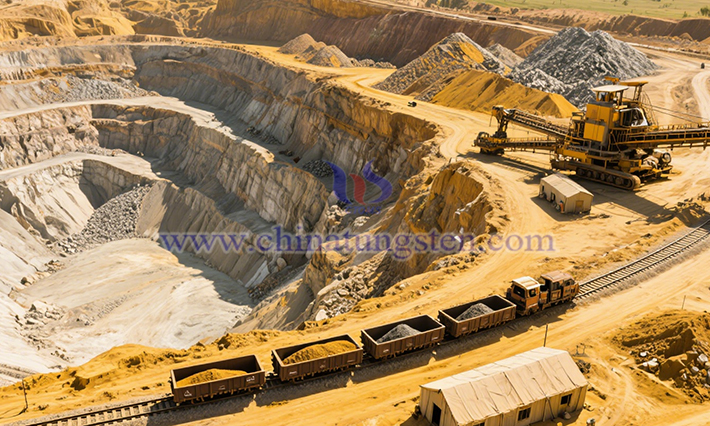China’s Regulation of Rare Earth Exports Is Reasonable and Legal
- Details
- Category: Rare Earth News
- Published on Wednesday, 11 June 2025 17:31
Recently, China announced new regulations to strengthen export controls on certain rare earth-related items, sparking widespread attention and varied interpretations. Some foreign media have labeled this move as a “diplomatic card” or “strategic weapon” in trade disputes. However, when viewed within the broader framework of global governance norms, China’s own industrial development needs, and international responsibilities, a more fair and rational conclusion emerges: this step reflects China’s proactive alignment with international practices, elevation of governance standards, and fulfillment of its responsibilities as a key supplier of critical minerals. Far from being a spontaneous “tactical countermeasure,” this policy is rooted in China’s deep need for sustainable industrial development and resonates with the global trend toward standardized management of strategic resources, ultimately aiming for their sustainable use and global co-prosperity.

China’s new rare earth export controls align with international norms, with the legal basis rooted in the dual-use military and civilian nature of rare earth materials. These materials are essential not only for manufacturing new energy vehicles, consumer electronics, and wind turbines but also play an indispensable role in advanced military equipment like fighter jets and nuclear facilities. Preventing the misuse of such strategic resources to undermine international peace and security is an obligation all nations must uphold. Export controls on resources with clear dual-use attributes are a standard international practice and a legitimate right of sovereign states to safeguard their security and fulfill global obligations. Thus, China’s legal implementation of rare earth export controls is a non-discriminatory measure to uphold world peace and regional stability, not a barrier targeting specific countries.
Interpreting China’s new regulations solely through the lens of international rivalry obscures the deeper logic of its industrial self-reform. Historically, China’s rare earth industry suffered from extensive, unsustainable development, with valuable resources sold at “cabbage prices,” accompanied by illegal mining and ecological damage. This model not only depleted national resources but also jeopardized the long-term stability of global supply chains. The introduction of the 2024 Rare Earth Management Regulations marked a new phase of legalized governance. The establishment of a rare earth product traceability system by relevant authorities has created a “transparent network” across the entire industry, targeting smuggling and tax evasion, and demonstrating China’s resolve to enhance industry standards and foster a healthy sector. By reforming to abandon the “growth at the expense of the environment” model, China is advancing toward high-quality, sustainable development, protecting its ecology while laying a more reliable and transparent rare earth supply foundation for global industries. Only through regulation can long-term progress be achieved, and a well-governed, eco-friendly Chinese rare earth industry will ultimately benefit international users.

While firmly regulating rare earth exports, China recognizes its responsibilities as the world’s largest producer and exporter, striving to balance national security, industrial development, and global supply chain stability. The goal is to “regulate exports” rather than “prohibit them,” and to “facilitate compliant trade” rather than sever normal commercial ties. The Ministry of Commerce has repeatedly clarified that compliant applications will be legally approved. Addressing concerns from the EU and others, Commerce Minister Wang Wentao, during talks with European counterparts, expressed willingness to establish a “green channel” for eligible applications, expedite approvals, and instructed working-level officials to maintain timely communication. This proactive response and pragmatic adjustment reflect China’s sincerity and efforts to collaborate with partners in minimizing the impact of controls on normal trade.
Amid deepening U.S.-China economic tensions and unreasonable blockades in critical technologies, China’s strengthened management of strategic resources may invite speculation. Mischaracterizing this as a “bargaining chip” in short-term rivalry underestimates the strategic depth of China’s policy. China’s rare earth controls are a deliberate decision based on international norms, domestic sustainable development needs, and its role as a responsible power, encompassing legal, governance, and global responsibility considerations. China seeks a rules-based, open, and inclusive international cooperation environment, not a zero-sum vicious cycle. Rather than succumbing to “decoupling” anxieties or “strategic weapon” misconceptions, stakeholders should focus on understanding and adapting to China’s new regulations, engaging in candid dialogue and cooperation to ensure this critical resource continues to contribute to global technological progress and green transformation within a peaceful, sustainable framework.
Source: Xinhua News Agency
- Chinatungsten Online: www.chinatungsten.com
- CTIA GROUP LTD: en.ctia.group
- Tungsten News & Price: www.ctia.com.cn
- Molybdenum News & Price: news.molybdenum.com.cn
- Tel.: 86 592 5129696; Email: sales@chinatungsten.com



 sales@chinatungsten.com
sales@chinatungsten.com